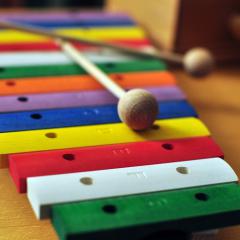Music

Music develops the whole student, and Village is dedicated to providing music classes for all students. Like typical music instruction, Village's music program teaches basic concepts to the lower grades that are scaled and honed as students progress through the program. For a glimpse into what Village's music program looks like, check out the interview with our Village School music teacher on what happens during a typical music class in …
How do you encourage the “inner musician” within each child to emerge?
"By giving them a variety of musical experiences (movement, percussion, singing, recorders, etc.) and by building on those skills and (hopefully positive) experiences year after year. If a child has participated in music from an early age, he/she is much more comfortable trying new things, participating without self-consciousness, willing to engage in singing, and open to listening to unfamiliar music without judgment, versus a child who has not had group music instruction prior to 5th grade. Positive experiences are the key, however, along with empowering children to see themselves as capable of making music on their own for personal enjoyment."
You teach all grade levels at Village. How do you tailor the content of each lesson to match the kids’ ability and interest?
"I start out with a plan for the grade level skills I want to help the children develop, a new concept I want to introduce, and/or a performance piece I want them to learn, and then work out the steps I will take or methods I will use to teach it. However, I always have to be flexible to respond in the moment, and always end up changing something to fit the needs of the class. I deviate from the plan if I see that the students are not ready for the next step, the activity is not suitable, the pacing needs to be changed, we need to spend more time with a certain part of the lesson, time runs out, I have a stroke of genius and go a different direction, etc. etc. The better I know each class, the better I will know ahead of time what to teach them and how I will do it in a way that is successful for them."
What does a typical week look like in your classroom?
"I set up the room to facilitate whatever unit we are working on and the instruments/space we will use, such as drums, xylophones, space for singing games, stands for recorders etc. I prepare the board with rhythm and solfege sequences or aids for review and practice, and sometimes use a document camera for displaying content. Depending on the unit, the students learn or use various procedures for going to seats, doing a warm-up or free practice/ exploration, and then beginning the lesson together. There are typically 2-3 different learning activities during the class time, involving and often combining vocal, rhythm, and notation-reading skills, listening, movement, instrument technique, and preparation for performance.
There is only one of me and usually three or more students who need some redirection, a question answered, or reminders of how to use an instrument, hold mallets, be in rest position during instructions, etc. It is wonderful when parents step in to help with these, so that every student gets the attention and help they need, and the flow of the lesson is only paused rather than coming to a halt for 10 minutes because I am trying to redirect or give individual help to many students. I am also more free to move around and give individual attention, because the extra adult eyes and ears can help monitor what is going on with the rest of the class when my focus is on one person, and problem-solving is made simpler and more efficient. Parents can also learn along with the students, play the instruments when there are extra, and be a great practice guide when students need to follow an example or get feedback.
Are you planning to hold a concert/performance this year?
"Certainly! I like to encourage regular performance as a way of showing you what your kids have learned and can do, generating excitement and anticipation for music, helping kids learn how to address nerves and stage fright positively, involving the community, and giving us goals to work toward. Musicians will always need an appreciative audience! Being an audience member is also a beneficial social and musical experience for kids; taking students to concerts of choral, symphonic, and world music can also help them develop an awareness for many types of music, instruments and vocal styles, high quality performances, and to understand better what genres they like best and why."


